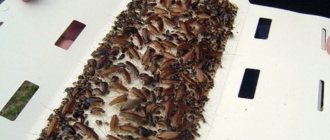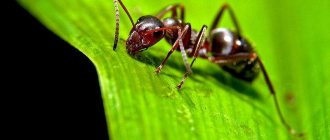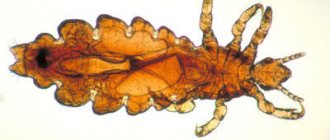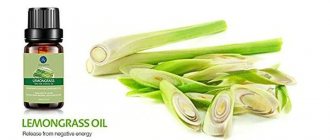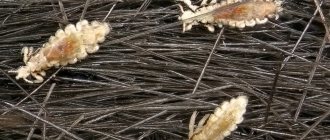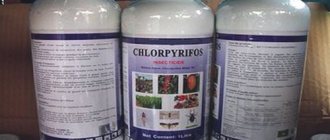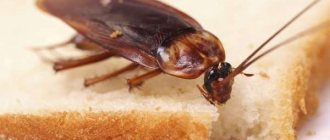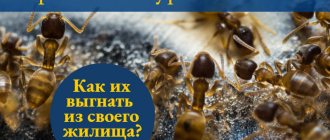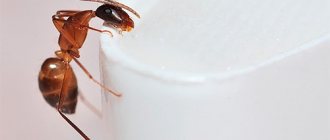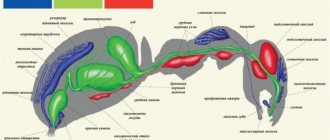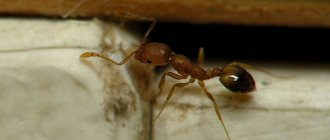Ants are very useful and hardworking insects. They tirelessly destroy insects all summer, build underground labyrinths, mixing the soil and opening air access to the roots of plants. But for a person such a neighborhood brings a lot of trouble. These tireless little ones get into all the cracks, get into food containers, underwear and clothes. They bite painfully and can cause skin inflammation and infectious diseases. Many people get rid of them at the first appearance using pesticides. While forgetting that they are an important link in the natural food web and ecosystem. Knowing what are ants afraid of, what plants and smells, you can simply drive them out of the house and garden, making the neighborhood invisible.
A clean kitchen is the key to the absence of ants in the house
First, of course, you need to start by eliminating the cause of ants appearing in the house. The habit of leaving unwashed dishes on the table overnight or leaving the trash can open must be stopped if you are serious about eliminating pests. Usually goosebumps appear due to four reasons:
- Unwashed dishes on the table.
- An open trash bin where insects can crawl.
- Rare kitchen cleaning.
- Food scattered around the house in uncovered containers is a favorite spot for insects.
Of course, there are cases when even in a typical house, where they carry out wet cleaning every day and do not allow themselves to litter on the kitchen table, ants can still appear. The reasons for this phenomenon may be different, but the most common is the lack of order in the house.
How do insects find their way into your kitchen?
Secondly, it is important to understand how these insects behave in order to more successfully combat them. Ants communicate with each other through touch, sound, and pheromones, a kind of chemical marks that they leave along the way, making up a kind of trail. Foragers - the goosebumps that search for food - also leave a trail of pheromones behind them, creating a trail between the colony and the food they find. Other insects follow this path in search of food. They perceive such chemical marks using smell, the receptors of which are located on the antennae. Deceiving nasal receptors and destroying their pathways is the key to successful victory over this type of insect. Believe me, this will be much more useful than running after each individual ant and spraying dichlorvos on it.
Physical intervention
Ants are afraid if a person interferes in the life of their family. Therefore, you can dig up their home, then there is a chance that the insects will not return to their original place. In addition, it makes sense to try to move the anthill to neutral territory: working individuals, once they are far from home, may be afraid to return. In addition, ants in the garden are afraid of such improvised means as ash, bark shavings, lime and soot. It is enough to simply sprinkle the nest on top and wait until the pests leave the area in horror.
Vinegar is a panacea for this type of insect
Vinegar is perfect to help you. This is the safest remedy for fighting ants, and one of the most intolerable and fatal for them. The fact is that insect receptors absolutely cannot tolerate its smell, and it affects their stimuli so strongly that the ant simply loses the pheromone trails left by the foragers. By tangling the paths and confusing them, we deprive insects of food, and over time they will definitely leave your home on their own. Acetic acid is generally a lethal agent - it simply corrodes the insect’s body, despite the fact that it does not cause any harm to humans.
So, what strategies do we know for fighting ants with vinegar?
- First of all, prepare a solution of vinegar and water, diluting them in a ratio of one to one. Pure vinegar will have too unpleasant an odor and will stick to your home for a long time. Some people simply cannot stand the smell of concentrated vinegar, and it would be expensive to waste everything on just ants.
- The next stage is surveillance. Yes exactly. You must observe the insects, determine exactly where their paths are and where they lead. It may turn out that an ant nest is located in your house or near it, and it will also need to be eliminated, because otherwise you will not get rid of them.
- Spray the solution along the paths and, if their nest is in your home, near it. The amount of material sprayed should be large - the more vinegar left, the more you will confuse the insects.
This way you will not only be able to get rid of insects from entering the kitchen. Moreover, the very fact of the persistent presence of an odor intolerable to them, moreover, everywhere in the apartment, the destruction of even the opportunity to form paths for searching for food will make the ants disappear from your home.
List of the most effective types of vegetation for pest protection
Repelling the parasite through the use of plants is a simple method, but requires timely implementation of measures. If ants have managed to settle down on a plot or in a house or apartment, then fighting them becomes a real problem. Therefore, if possible, you need to start getting rid of the arthropod at the first sight.
Lavender
Lavender is suitable for use either fresh or as a prepared essential oil. The plant is characterized by a sharp, tart aroma that repels ants.
It is recommended to plant flowers on the site, and to use oil and freshly picked grass in the house or apartment. It is best to place lavender near window openings, baseboards, and ventilation systems.
Melissa
If you are interested in what red, black and other house ants are afraid of, then lemon balm is one of the spice options. The smell of the grass is pleasant to humans, but pests flee from it.
Among the options for use: at home, in the fresh air, both freshly cut lemon balm and essential oil are suitable.
Mint
Mint is similar to lemon balm, but is a more common plant in summer cottages. Experienced gardeners advise planting the presented grass near flowers and vegetables.
Thanks to this trick, it is possible to preserve productivity from the invasion of arthropods. Inside the apartment, you can use dried mint or peppermint oil.
Valerian
At home, it is suitable to use a solution of valerian - for this it is necessary to lubricate with the liquid the places where insects supposedly made their way in the room, as well as their habitats.
Another effective folk remedy is washing the floor with a solution of water and valerian. In garden areas, planting such fragrant grass will be effective.
Nasturtium
Humans are not susceptible to the pungent aroma of nasturtium flowers, but ants, which have a heightened sense of smell, cannot tolerate such a plant.
Because of this, you will never meet arthropods where nasturtium grows. At home you can use crushed flowers.
Rosemary
Rosemary is valued as a spice in cooking. But pests cannot tolerate grass with a pungent odor at all. If we talk about using it at home, then the powder is perfect, which is recommended to be scattered throughout the room, paying special attention to places where parasites accumulate. The dacha plot can be landscaped with spice bushes, and inaccessible places can be watered with rosemary solution.
You can prepare the recipe according to the following recipe:
- Boil water (one liter).
- Add 1 tablespoon rosemary to the liquid.
- Cool.
Potato
Despite the fact that this vegetable is not characterized by a pronounced aroma for humans, ants smell quite strongly the smell of the root vegetable, and to be more precise, the starch.
To prepare a repellent, you need to cut the vegetable into several pieces, then spread it around the perimeter of the room. If there is an open space, rotten root vegetables will do.
Dill
Among the plants that repel aphids and ants, dill has an excellent effect - this type of spice is characterized by a mild fragrance for people and a tart scent for pests. Experienced summer residents organize extensive planting of the territory with dill, especially in places with high concentrations of arthropods.
It is best to plant the spice near cabbage and radishes - this is an additional protection for vegetables from aphids. Dry and fresh dill are suitable in the apartment.
Parsley
Parsley also has a pronounced smell, with the help of which you can easily drive away said guests from a country plot or home. Essential oils contained in the grass can repel even a large colony of insects. Dry parsley is an ineffective method.
Mustard
Tart mustard not only drives ants out of the room, but also damages their nervous system. Areas planted with this spice eliminate the possibility of anthill formation.
At home, using grains or mustard powder is suitable. The method of washing the floor with the addition of dry powder has good results.
Cilantro
Cilantro is a nuisance to arthropods and fleas. By planting such grass you will quickly scare away the invasion of parasites. It is best to plant cilantro near flower beds, tomatoes, and cabbage. Indoors, using dried cilantro will be effective.
Anise
Anise grain is used not only as a spice for dishes and baked goods. The seasoning is not to the liking of ants, so it is successfully used to repel them. The perimeter of the summer cottage can be sprinkled with grains, paying attention to places where pests accumulate.
You can prepare a decoction for home:
- Boil water - 0.5 liters;
- Add anise seeds - 1 teaspoon;
- Cook for five minutes;
- Cool.
Rinse the floor with this solution and lubricate the areas where insects were noticed.
Please note that anise may cause allergic reactions in pets.
Fennel
Fennel has a pleasant aroma for humans, but it is unbearable for pests, which is why they will quickly leave the room where this herb smells. Fennel can be planted in flower beds and vegetable gardens. Dried fennel will work well in the apartment.
Thyme
The strong aroma of thyme can cause a panic attack in an ant, which is why it is often grown in a summer cottage near crops that are susceptible to attack by arthropods.
The powder shows itself excellently in the fight against parasites both in the house and on the site where it is impossible to cultivate grass. Insects quickly move away from the source, and then do not return back for a long period.
Marjoram
This tasty spice and medicinal herb is excellent at repelling pests. A good way is to plant the plant in garden plots and in pots at home.
The spice repels red and black ants, fleas, and aphids. Marjoram is one of the most popular environmental remedies for relief.
Basil
Basil has a tart, unique aroma that insects do not like; they can easily drive out ants. Fresh basil is used outdoors. Dried herbs will work better indoors.
Thyme
Thyme is a useful plant for humans because it contains a large amount of vitamins and has an anti-inflammatory and antibacterial effect. The grass has a mild odor, but repels parasites.
Garlic
Ants are also afraid of garlic, one clove of which is enough to scare away an entire column of individuals. The land where garlic grew will never be replenished with anthills, which has become an effective technique for many summer residents who plant the crop near vegetables and berries that are subject to attack.
In an apartment, you can use a garlic-based decoction, which has a mild fragrance and does not cause unpleasant sensations in people.
Chives
This option is not as effective as the previous one, but is still used as an ant repellent. When planting the presented crop, the possibility of insects settling near this area is excluded.
It is problematic to use this option at home, since only fresh onions have a tart smell. We recommend boiling your hands, and then using the prepared solution to coat the paths along which the parasites move.
Daisy
If we talk about flowers, the best ones here are daisies and marigolds, which have the same properties and a similar aroma.
Flower beds planted with these varieties of flowers are free from pests. It is best to plant daisies near peonies, since they are the ones who most often suffer from arthropod infestations.
Marigolds and daisies can also be grown at home in pots.
Ageratum
An equally effective flower that repels pests is ageratum, which is classified in the genus of asters. It has a tart aroma.
The fluffy inflorescence blooms for almost half of the summer and all autumn, preventing ants from developing normally. Also suitable for growing indoors.
Protective plants
Like many other crawling insects, ants try to avoid plants with a strong odor. They are not poisonous to them; pests simply try to avoid them. But many gardeners and gardeners know very well that they help against ants and many other insects:
- marigolds;
- lavender;
- peppermint;
- lemon balm;
- catnip;
- nasturtium;
- rosemary;
- dill;
- parsley;
- fennel and other aromatic herbs.
Plants that ants are afraid of are not dangerous to their health. They simply attract lacewings, hoverflies, ladybugs, and ground beetles, which actively destroy aphids. That is, in places where such plants grow, ants will not be able to provide the colony with a sufficient amount of sweet honeydew, and therefore they try to settle away from them.
Fragrant plants can be used as borders around garden beds. Most of them are unpretentious and useful on the farm. In addition, they repel not only black and red ants, but also other pests. In addition, it is a truly natural and environmentally friendly product.
You can also treat areas where insects accumulate with a strong decoction of green plants that repel pests by simply spraying it from a spray bottle. It is worth remembering that the aroma quickly disappears and the treatment must be repeated regularly.
To prevent ants from getting into your laundry and kitchen cabinets, you can place bunches of dried lavender or mint in them. This technique allows you to give things a subtle, pleasant aroma.
The essence of prevention is to wipe the window sills, baseboards, and kitchen table with vinegar diluted with water from time to time. Ants usually enter the house through the windowsill or baseboards, and the kitchen table always remains their desired target, especially if there is something left over from lunch or dinner, or there are simply bread crumbs on it. This procedure will prevent insects from “opening” your home again and making new paths to food. Of course, this smell will become your companion for a long time if you do not want to use untested chemicals. But, on the other hand, by wiping the kitchen with a vinegar solution from time to time, you use much less of it than when spraying along ant paths, and accordingly the smell will be much less. You shouldn’t get used to it, but you won’t be able to do without it if these insects bother you.
What plants are ants afraid of?
These insects cannot tolerate the smell of strong-smelling plants, so this environmentally friendly and, most importantly, aromatic product can be used in your own home.
Fresh or dried wormwood or tansy, mint or lemon balm, and other aromatic plants - all this can be used in the fight against ants.
Potato
- To combat ants, you can use both potato tops and potato peelings.
- The thing is that green mass and fruits contain toxic substances, as well as starch.
- It is by eating them that the ants die.
Lavender and marigolds
- Lavender repels ants with a pungent aroma that insects simply cannot tolerate.
- It is enough to cut the inflorescences themselves and place them fresh or dried around the house or garden.
- Marigolds repel ants due to special essential compounds contained in the root system, which disinfect the soil, driving away insects.
Mint and lemon balm
- Mint, like lemon balm, repels ants from the house and garden with its smell; for humans it is pleasant, but for insects it is a real flying poison.
- You can scatter the dried plant around the site or in the house, but as an option, plant it in a flowerpot and place it on the windowsill, or on the site, in places where they are most concentrated.
Dill and parsley
- Like mint and lemon balm, parsley and dill release ethereal compounds into the air, aromas that ants cannot stand.
- They can also be scattered or planted dried/fresh in areas where insects are most concentrated.
About the advantages of repelling methods
Ants living in homes cause significant damage to health, as they crawl everywhere, carry infections, and get into food. These seemingly innocent insects can come from anywhere, for example, from the street on shoes or with garden soil from the garden. In any case, they cause discomfort, and it will take a lot of time to remove them.
Their small size and their ability to live in entire colonies allow ants to stay in hard-to-reach places. There are several methods that you can use to ensure that they leave the premises forever.
Several repellent methods and their advantages:
- Ultrasonic devices. Modern devices run on batteries or electricity. Their main advantage is coverage of an area with a radius of up to 100 m. High-frequency ultrasound radiation protects against insects of all types: flies, cockroaches and mosquitoes.
- Traditional methods. For repelling, environmentally friendly products are used that do not affect the health of people and animals.
- Keeping the house clean. Cleanliness in your living space is a means of preventing unexpected guests from appearing. It is recommended to clean regularly and not leave food and water in visible places.
- Use of chemicals. Modern chemicals are effective, and many owners prefer their use.
Positive results can be obtained by repelling insects using one of these methods, the main thing is to do everything correctly.
Reviews
Lidiya, Voronezh: I asked myself the question of how to get rid of domestic red ants after these insects settled in my kitchen. We immediately abandoned the use of pesticides, deciding to try traditional methods. Boric acid turned out to be the most effective.
Svetlana, Kirov: We live in a private house, and small red ants are frequent guests on our site. Previously we bought Dichlorvos, there was an effect, but short-lived. About two years ago we took Absolute bait capsules, and since then insects have not appeared in our house. One package is enough for the season.
Ants can cause a lot of damage, both in the house and at the dacha, but, still resorting to their extermination, you should choose methods of control that do not harm the environment.
*Prices are current as of August 2021.
What are ants afraid of at home: how to get rid of them
If the fight against these insects in the garden can be carried out more or less without haste, then when ants appear in the house, there is not much time left to think and sort through options, especially if the pests invade you en masse.
You can try using the products that ants are afraid of at home from the list above, but the most effective way to get rid of pests quickly is with special insecticides.
Why are ants dangerous in a summer cottage?
Why everyone poisons insects in houses and apartments does not raise questions. But in gardens and vegetable gardens, ants are often ignored, thinking that they do not pose a threat to the crop. But insects lead to many problems:
- Aphids appear on the site. These pests produce nectar that ants like. Usually both species live nearby. Aphids damage trees and shrubs, leading to plant death. It is impossible to get rid of it if ants live on the site.
- Ants are loosening the ground. They constantly create underground passages. Fertilizers do not penetrate into such soil, and plant roots are constantly damaged.
- Some ants eat vegetables, flowers and berries. They destroy strawberries, blueberries, strawberries, as well as beets and carrots.
- This type of insect feeds on seeds. If a large number of plants did not germinate on time, and there are a lot of ants on the site, the reason is pests.
- Ants destroy wood. Wood shavings and wood chips are building materials for an anthill.
If you do not fight ants, pests can completely destroy the crop and, worst of all, cause the death of trees and shrubs.
Let's figure out whether ants can cause harm to humans, and if they can, then how. Let's start with the fact that these hard workers, with their characteristic persistence and energy, spoil food. They can move on absolutely any surface, including a trash can or dirty floor. That is, they are in no way inferior to insects such as cockroaches in the spread of various infectious diseases.
How to deal with ants in the garden
Garden ants do not pose a direct danger to people, because they do not spoil human food and therefore are not capable of transmitting infections. But they usually cause no less negative emotions, primarily due to the fact that they breed aphids on trees, the sweet secretions of which they feed on. And aphids, as you know, are a dangerous garden pest. In addition, they can damage fruits and berries, reducing yield, and spoil young plants.
For more information on how to fight ants in your garden, read our article - Ants in your garden: traditional methods of control.
Boiling water
The easiest way to deal with ants is to pour boiling water over their house. First you need to stir up the anthill so that the water penetrates deeper. It is advisable to carry out the treatment several times in a row - every day or every other day, until the absence of insects becomes noticeable. Basic Rules:
- You need to use several liters of boiling water, at least 2-3 (the larger the anthill, the more boiling water).
- for greater effect, add to the water: vinegar,
- essential oil or citrus peels,
- ammonia,
- special ant repellents - insecticides.
Reviews about this method vary; if the ants have already dug deep into the ground, they cannot be completely destroyed with simple boiling water. In this case, it is better to try water with additives or combine several methods.
No matter how sad and difficult it was, we poured boiling water over the anthill. They took a three-liter kettle and poured boiling water directly into the center, pouring it slowly so that it would go inside. But we had ordinary ants, and I wouldn’t say it was an invasion, but they were still annoying..
Elol
https://indasad.ru/forum/31-vrediteli-i-bolezni/55-kak-izbavitsya-ot-muravev?start=10
Tar
The smell of birch tar repels ants and other pests, such as aphids, mole crickets, mosquitoes and midges.
It is used in several ways:
- Tar-soaked bandages or gauze strips are wrapped around the tree.
- Apply the product to the tree trunk with a brush, at a distance of 3–5 centimeters from the ground. The width of the tar word is no more than 5 cm.
- Shrubs can be sprayed with a solution containing tar soap. You will need half a bar for 10 liters of water, as well as 5 tbsp. fly in the ointment.
- In the garden they also use a recipe with pressed sawdust. They are moistened with a large amount of tar and then filled with boiling water. When the mass swells, it is laid out on the anthill and between the beds.
The treatment should be repeated when the smell begins to fade.
Soda
You can use soda against ants in your garden in a very simple way:
- pour concentrated soda solution into the anthill and worker paths,
- Place circles of baking soda around the trees.
With salt
Baking soda can also be used mixed with salt. To do this, you need to mix both substances in equal proportions and sprinkle the resulting mixture on ant paths and nests.
With vinegar
Using baking soda and vinegar is effective.
- The anthill must first be stirred up.
- Fill it with soda, paying special attention to the holes - the more substance gets inside, the better.
- Next, fill the anthill with vinegar.
Of the recipes with soda, this one is considered the most effective.
Ammonia
In a garden plot, the use of ammonia against ants is justified not only by the effectiveness of the product, but also by the nitrogen content in it - a macronutrient useful for plants. There are several recipes:
- Dissolve 100 ml of ammonia in 1 liter of water. Pour the resulting mixture over the anthill. It’s good to undermine it first or destroy the tiers that are on top - this way there is a greater chance that the substance will end up in the queen ant’s lair.
- Soak a cloth in ammonia and cover the anthill, placing polyethylene on top so that the substance does not evaporate. The smell of ammonia will cause the ants to leave the nest.
- To prevent the appearance of ants, plants in the area are watered weekly with water and ammonia (10 ml of ammonia per 10 liters of water). It is necessary to pour the solution at the root.
There is an important point: it is better to prepare the treatment solution with filtered or boiled water to avoid unwanted reactions of ammonia and impurities.
Ammonia products also help control aphids. To do this, plants are sprayed with a solution of 1 tbsp infused for 30 minutes. spoons of ammonia diluted in 8 liters of water.
Mustard powder
Ants do not like the aroma of mustard, so you can sprinkle the entire area around the perimeter with its powder. It is important that it is fresh and not expired. There are two ways to use the product:
- pour the dry substance onto the ant paths and into the anthill,
- Sprinkle the plants with a solution of mustard powder.
Prepare and use the solution as follows.
- Take 100 grams of the product.
- Dilute in 10 liters of warm water.
- Spray the plants thoroughly with the mixture until the leaves become wet.
Both dry and wet treatment with mustard is carried out only on dry beds. If it has rained recently, you may want to wait a while. From the anthill, before pouring powder into it, you need to remove the top layer.
Some people use a mixture of mustard powder and ground coffee. They are mixed in a 1:1 ratio and poured into the anthill.
Mustard is more suitable as a preventive measure or if there are few ants in the area. The downside of mustard powder is that it irritates sensitive skin and can cause burns to mucous membranes, so you need to wear gloves when processing and prevent children and pets from coming into contact with the substance.
Kerosene
The anthill can be watered with kerosene, as it is harmful to insects. But they do not use a pure substance, but a mixture of it with water. The solution is prepared in the proportion of 1 tablespoon of kerosene per 1 liter of water. Usually one treatment is enough to get rid of pests. Another option is to place rags soaked in kerosene under bushes and trees in the garden. It is better to use a method in addition to the first. Under no circumstances should pure kerosene be poured under plants, as this will kill them.
In the spring, I first sprinkled everything with mustard, then switched to salt - it didn’t help. I decided to complicate the recipe and spilled water on everything. Ants crawl over this cocktail like they crawl over asphalt. dance2.gif Purely by chance, I found a bottle of kerosene in the house (it had been sitting for 30 years), coated the legs of the stands and slightly spilled it on the ground, the effect is amazing!
Lumberjack
https://www.pchelovod.info/lofiversion/index.php/t5890–500.html
Lime
You can try to drive away the ants with lime. To do this, it is poured generously into the anthill and along ant paths. Tree trunks and tree trunk circles are also treated with concentrated lime solution.
Ash
Ash from ants is used in the form of a decoction, and the dry substance is used for prevention. It is effective not only against the ants themselves, but also against their “cash cows” - aphids.
Ash infusion is prepared as follows.
- Dilute 1.5 kg of ash in 5 liters of boiling water.
- Infuse the mixture for two days in the dark.
- After the expiration date, strain the infusion.
- Add 40 grams of soap, stir everything well.
- Spray with planting agent.
There is another, faster recipe:
- Dilute 300 grams of ash in a liter of boiling water.
- Simmer the mixture for half an hour over low heat.
- Dilute the broth with water to a ten-liter volume.
- Add 40 grams of soap, stir well.
- Spray leaves and stems of plants.
To prevent the appearance of pests around flower beds and vegetable gardens, you can dig shallow grooves into which crushed ash is poured. It should be covered with a layer of earth on top. You can simply sprinkle the product around the perimeter of the entire area.
Pepper
The hot spice is used in the fight against ants. Both black and red ground peppers are used - they are sprinkled on the anthill and insect paths. You can also try chili. The plants are also sprayed with an alcohol tincture of hot capsicum, which is sold at the pharmacy. First you need to dilute it with water in a ratio of 1:7.
- You can also make your own pepper tincture.
- Mix a bag of ground black pepper with 1 tablespoon of soap.
- Place the mixture in a liter of boiling water.
- Leave for a day, then strain.
- Spray the plants and ant nests with the resulting infusion.
Cinnamon
This spice should be sprinkled generously into the anthill and along the ant paths. The smell of cinnamon will eventually make the insects leave. Although it is possible that they will place a new nest in the same area, so it is better to combine this method with others.
Against wood ants living in the bathhouse, it is recommended to place cinnamon sticks between the logs.
Urine
Although the ants themselves produce acid (formic), they cannot tolerate other substances of this type. This explains the effectiveness of using urine against them, because it contains hippuric and uric acids. To remove insects, you need to regularly water the anthills with fresh urine.
“Urine” translated from Latin means “urine.”
I read a lot of recommendations and advice about ants on the site. My mother-in-law got rid of ants with urine. I also tried it. The eggs were stolen, I don’t know whether they will appear or not.
Valentina
https://www.dddkursk.ru/number/556/home/000266/
What to plant on the site
Since ants cannot stand a number of odors, you can plant certain plants in your garden or garden that will help repel pests:
- garlic,
- onion,
- cloves,
- valerian,
- marigold,
- mint,
- laurel,
- mustard,
- anise,
- parsley,
- tansy.
Many of the listed herbs are also used in the fight against other unwanted insects, so any summer resident should take note of this method.
Photo gallery: plants that repel ants
Onions in the garden will help drive away ants
Both growing garlic and its cloves are effective in the fight against ants.
Garden carnations planted on the site will not only please the eye, but will also repel ants
Valerian is a recognized medicinal plant and also helps get rid of ants.
Marigolds protect the area from many pests
In regions with a warm climate, laurel can be grown on the site
Mustard is an excellent green manure - a natural fertilizer for the earth - and at the same time helps to cope with ants
Ants do not like the famous herb anise
Tansy will repel ants both fresh and cut or dried
Mint repels ants and ticks
Parsley is not only a tasty addition to the diet, but also an assistant in the fight against ants
Video: folk methods of fighting ants in a summer cottage
Analysis of the problem and probable causes
Before embarking on a stubborn and victorious struggle, homeowners must honestly and objectively answer the following questions for themselves:
- Is it customary to leave dishes unwashed from time to time?
- does everyone in the house cover the trash can with a lid;
- Is the apartment regularly cleaned?
- Is there a custom at home to store food in open food containers?
The exact answers of each person living in an apartment, country house or house will determine how fast and effective the upcoming struggle will be.
Insects can only be removed by correcting the previously established state of affairs.
By changing household routines to the extent necessary, it will be possible to truly eliminate the cause of the spread of pests in housing - at home, in the country, in an apartment.
To consolidate the results achieved in the fight, it is necessary to maintain perfect order at home or in the country for several days, or better yet, for at least one week, without leaving food open and without provoking another invasion of ants.
Chemicals and flammable substances from ants
They must be handled carefully , keeping children and pets from the surfaces being treated . And there is no need to set anything on fire - the principle is based not on the combustion temperature of harmful chemicals, but on its “aroma” for ants. Among the most powerful means are :
- ammonia;
- petrol;
- kerosene;
- some solvents;
- Dishwashing detergents containing essential additives, such as lemon.
It is better to discard the latter option, since their odor retention period is short. Solvents can be dangerous to warm-blooded animals, and they smell terrible.
We recommend sticking to gasoline and ammonia . In the first case, one treatment is enough for the insects to leave the house. To do this, coat the area of the anthill and ant trails with liquid. It is advisable to leave the house for about a day after this. With ammonia, the technology is the same as in the case of vinegar, you just need to reduce the concentration of the active component by three times for large areas, and by five for small ones.
Ants have poor hearing and vision, but they can smell well —their sense of smell is comparable to that of a dog. For this reason, most products that can repel these insects are based on a powerful aroma . Moreover, many of them are neutral for a person, and sometimes even pleasant.
to treat the entire housing, but only the areas where pharaoh ants accumulate . Remember that repellents do not destroy ants , but only limit their activity or drive them out of the apartment. For a more radical fight, other drugs are needed, for example, gels!
TOP 20 “folk remedies” for ants
After conducting an analysis, we grouped all the “folk remedies” for fighting ants into TWENTY groups, the most effective and proven by many years of practice. Perhaps some are familiar to you, and some will be a discovery for you.
Medicinal chamomile
Dry medicinal chamomile is sold in any pharmacy. Directions for use: Sprinkle dry in areas where ants are found. A special type of chamomile, pyrethrum, shows good results.
This method is simple and absolutely safe for both people and pets.
Sweet trap
A sweet trap is a glass of water with sugar or honey. Directions for use: dilute 2 tablespoons. spoons of sugar or honey in a glass of warm water. You can add fresh yeast. Traps are placed in places where ants gather. Ants will crawl towards the sweet treat and drown in the water.
Baits with boric acid
This is an effective method of getting rid of ants on your property and at home, proven by many years of practice. Ingredients: sugar/honey and boric acid and water. All components are mixed, the finished working composition is distributed drop by drop along the paths of movement of the ants.
Considering that powdered boric acid is poorly soluble in water, boron balls/crumbs are made. To do this, boric acid is mixed with a food attractant (either egg yolk, or minced meat/pet food, or boiled potatoes, or honey or other “goodies” for ants). You can add glycerin to the bait, which will keep the bait moist and prevent it from drying out.
Boric acid in baits is an effective and simple way to combat ants
Boron balls or boron crumbs are laid out or scattered in places of accumulation and along the paths of movement of ants. The ants also take these crumbs to their nest, which allows them to quickly deal with these insects.
How to properly make baits with boric acid, quantity, frequency of use, timing, see a separate material.
This method requires precautions for pets.
| READ MORE: “Boric acid for ants and cockroaches (FOUR basic recipes and ready-made preparations)” |
Yeast from ants
Yeast is diluted in warm water with the addition of a small amount of sugar. In this option, you can use wine wort and kvass starter. The mixture is spread into small containers, which are placed in the habitats of the ants.
Garlic
Garlic is primarily used to get rid of house ants. Their paths of movement are rubbed with garlic, the bright smell of which will repel insects forever. You can also take finely chopped garlic, after which it is applied with a brush to problem areas. The method is very labor intensive.
Essential oils (mint, eucalyptus, citrus, etc.)
Such repellers do not destroy insects, but force them to leave their nesting sites. To prepare active solutions, you need to take 1 liter of warm water and add 20 drops of any essential oil from plants such as mint, eucalyptus, lavender, fir or citrus.
Currently, as before, the main method of fighting ants is chemical (use of insecticides). Powder or granular preparations, sometimes emulsion concentrates, are used. They differ from each other in chemical composition and principle of action.
Among the most used are preparations based on diazinon, chlorpyrifos, cypermethrin, malathion, fipronil and a number of other active ingredients.
For example, diazinon is one of the strongest poisons that acts as quickly as possible and protects against ants for a long time. It is based on, for example, the drug “HECTOR for ants”, which is capable of destroying an entire colony through just one infected ant, which, having eaten the poison, will return to its relatives in the nest.
MORE about the drug "HECTOR against ants" (composition, instructions for use, restrictions, etc.)
Anise seeds, laurel and valerian extracts
Anise seeds are crushed and mixed with unrefined vegetable oil. This liquid is used to lubricate the areas where ants appear. A pungent and persistent smell will force ants to look for more comfortable places for their further life activities.
In addition to anise seeds, it is permissible to use other plants, as in the previous case. The most commonly used extracts are laurel, oregano, valerian, etc.
Glue traps
The simplest adhesive traps are made from double-sided tape. One side of the tape is glued to any base, and any food bait should be placed closer to the center. It could be a drop of honey or a berry from jam. Insects will try to get to the bait and will simply stick to the tape.
Hunting belt for trees against ants and other insect pests
The same principle applies to adhesive hunting belts on trees. To prevent ants and other garden pests from climbing up to the fruit ovaries and leaves from the ground, along the tree trunk, and from breeding aphids there, belts are made. A special garden glue of permanent stickiness and a backing made of any material are used - fabric, polyethylene, cardboard, etc.
| READ MORE: “Catching belt for trees against garden pests (what they are and how to make it yourself)” |
Red pepper, mustard powder
Ants also cannot tolerate these seasonings, just like pharmaceutical chamomile. You should sprinkle them on all the places that insects have chosen. After a day they will leave them.
Moving an anthill
A simple and effective way is to dig up and move the anthill outside the dacha. The soil under the anthill should also be disposed of - moved outside the garden plot, as there may be numerous larvae in it. Pour boiling water over the former anthill site.
Boiling water (boiling water)
This method is known to many; it cannot be called humane, but it does exist. An anthill is filled with boiling water. However, the use of this radical measure will help to destroy the ants only locally, but at the same time seriously destroy the microflora of this place.
This method should be used as an emergency method.
Using boiling water to control ants
Boiling water can be used in another way - to make sugar bait. Soak a foam sponge in sugar syrup and place it in areas where ants gather. As soon as the sponge “sticks” with ants, transfer it to a metal bucket and pour boiling water over it. Repeat this several times to dramatically reduce the number of insects.
Growing plants that repel ants
You should grow bright-smelling plants in your garden and garden plot - marigolds, garlic, onions, parsley. The smell of these plants repels ants.
Garlic is planted in strawberry beds.
Chamomile and calendula should be sown next to currant and gooseberry bushes - they attract ladybugs, which actively eat aphids.
Fighting aphids
An indirect way to fight ants is to fight aphids, honey bugs, mealybugs, leafhoppers, i.e. those insects that secrete large quantities of honeydew (the delicacy for which the ants breed them and take care of them).
A classic example of trophobiosis is ants and aphids.
Young shoots of fruit bushes, in the twisted leaves of which aphids live, are rinsed in tobacco or soda solutions with the addition of green soap. Such solutions are applied to mature trees using sprayers. Any means of combating aphids is used - both chemical and folk.
Being symbionts, ants and aphids are interconnected - the destruction of aphids contributes to a significant reduction in the number of ants.
Smoked meats
Smoked meats are an effective fumigant against insects, including ants.
The pungent smell of smoked meats repels ants and forces them to leave their habitats. To do this, lay out the remains (usually heads) of smoked fish. Or you can soak sawdust in smoking liquid and spread it around the area.
Semolina and other cereals
Ants love semolina, wheat, corn grits, millet, but are not able to digest it. To do this, sprinkle the anthills generously with cereal. Having eaten this “delicacy” they die over time. Simple and effective.
Using strong odors to repel ants
Tobacco and shag dust
It is effective to use repellent odors to get rid of ants. You can sprinkle anthills and places where they accumulate with tobacco or tobacco dust. The disadvantage of this method is that the smell quickly disappears or loses its properties after rain.
Kerosene, diesel fuel, carbolic acid for ants
You can pour kerosene or diesel fuel on the anthill, but do not set it on fire!!! Insects will be forced to leave their place of residence.
When using carbolic acid, use the following ratio -10 l. water + 2 tbsp. spoons of carbolic acid + 10 tbsp. spoons of kerosene + laundry soap. Anthills are filled with this composition.
To repel ants from trees and shrubs, place rags or rags soaked in these substances under each tree. There are also repellent trapping belts for trees and the use of diesel fuel or kerosene.
Water obstacles
Due to their abilities, ants cannot overcome water obstacles, even small ones only 2-3 cm wide. This can also be taken into account in the fight against ants.
Salt
Salt is a natural preservative, destroys any living organisms, and makes the habitat of ants unsuitable. You can sprinkle it on the anthill, places where ants move, paths, and cracks between the tiles with salt. Simple, cheap and moderately effective.
Using salt or lime to control ants
Lime from ants
To scare ants away from trees, use ordinary or bleach. Quicklime is sprinkled on anthills and then spilled with water. Just as in the previous case, lime makes the habitats of ants unsuitable for their life.
Is vinegar an effective method?
Any remedy has its drawbacks. Vinegar is the least harmful to humans and is suitable for processing vegetables and berries, but it also has its drawbacks. The acid evaporates very quickly, so one treatment may not be enough.
To make pest control more effective, use a strong vinegar solution in apartments. In summer cottages, use acid together with soda to enhance its effect. And be sure to create a greenhouse effect by using polyethylene.
A vinegar-based solution is one of the safest insect repellents. It is easy to prepare and does not require any special expenses. The pungent smell of acid repels ants, and the concentrated liquid can quickly kill pests.
Repellent methods
When ants appear in an apartment, the fight against them must begin immediately, before the number of insects becomes critical. In addition to substances and plants with a pungent odor, other methods of insect control can be used. It is known that red ants are completely intolerant of the following factors:
- cold;
- lack of water and food.
Red ants, like any other insects, prefer to build their colonies in places suitable for life and full reproduction. A sufficient amount of water and food is of decisive importance for them. Poor environmental conditions force ants to leave their habitable place. If you create unbearable living conditions for ants, there is a high probability that they will independently leave the inhospitable room.
Cold
Ants like to keep the temperature in their home at a comfortable level. If a gradual cooling begins in the apartment, the ants quickly leave it. It is most convenient to get rid of ants using cold in late autumn or winter. To do this, you need to turn off the heating in the house, open all the windows and doors and leave the room for a couple of hours.
Lack of water and food
Red ants, as a rule, appear in the apartments of unscrupulous owners. In an untidy apartment, insects find enough food and water for a comfortable stay. To get rid of them, it is enough to follow basic hygiene rules. If insects are deprived of food and water, they will be forced to leave.
Aromatic oils against ants
Without the ability to use fresh or dried herbs, you can repel insects with the help of aromatic oils. You can purchase them at any specialized store or pharmacy. Aromatic oils are concentrated oils containing extracts from certain plants. They have a distinct odor and retain it for a long time.
Aroma oils are preventive agents for the appearance of insects. Among these oils are:
- lavender;
- lemon;
- cedar;
- pepper;
- mint
- anise, etc.
Having chosen oil, it is recommended to coat all windows, ventilation grilles, doors and other openings through which insects can enter the house.
You can also dilute a few drops of this oil in water and treat the surfaces with a spray bottle. This method will not only prevent the appearance of ants, but will also fill your home with a pleasant smell.
Cedar oil can be diluted in water and sprayed onto surfaces in the house from a spray bottle.
Protective plants - one of the fears of ants
Ants, like crawling insects, cannot stand plants that have strong, pungent aromas. Such plants are not poisonous to these insects, but they avoid them. This is due to the fact that these grasses attract other insects that eat aphids. And without the presence of aphids, the ants will not feed themselves and will not provide food for the “queen”.
Such plants include:
- lavender;
- dill and fennel;
- wild mint;
- parsley and cilantro;
- nasturtiums, marigolds;
- and etc.
We see that among such plants there are even flowers and aromatic herbs that are used in cooking.
Experienced gardeners use such plants on their plots, planting them in borders, flower beds or beds. They repel harmful domestic insects and are beneficial for the household. These are environmentally friendly and natural means of protection against harmful garden ants.
Summer residents make strong decoctions from these herbs and spray them with a spray bottle on all places where insects accumulate. This should be done systematically, as the smell disappears quickly.
For house ants, you can place dried herbs of these types on kitchen cabinets and bedside tables. The most commonly used flowers in the home are lavender or mint. They express a bright aroma and act as a natural repeller for ants. In addition, such products will give the room a subtle, pleasant herbal aroma.
Mint bushes will be an excellent barrier against ants
Vinegar solution for treating the garden
You can cope with an ant invasion on a plot of land using several types of vinegar:
- Apple. You should choose a liquid with an acid content of 6%. It can be used undiluted.
- Dining room. Vinegar 9% must be mixed with water in a 2:1 ratio.
- Table with added oil. For one liter of acid you need to add several liters of sunflower oil. Then add a little water to the product. Instead of sunflower oil, you can use flax seed oil.
- Apple low percentage. The acid must be mixed with water in equal proportions. This solution is suitable for spraying tree leaves.
- Table with the addition of soda. This is a strong mixture that can quickly kill insects. Soda is poured into the anthill, and then table vinegar is poured.
More concentrated solutions are suitable for treating the anthill and the area around it. Weak mixtures are necessary for disinsection of trunks, leaves of trees and shrubs. It is not difficult to destroy ants in the garden using folk remedies with the addition of vinegar.
Tip: A weak solution of apple cider vinegar can be sprayed on tree bark as a preventive measure. This helps repel insects.
Mosquitoes
You don't have to go to the hardware store for all those toxic products they sell to keep those buzzing, biting pests from ruling your home.
To keep insects away, try this mixture as a repellent diffuser:
Getting a haircut at home to make it look like something from a salon: 9 stylish hairstyles
Fashionable looks with jeans for the spring season 2021: looks for any style
Gemini and 3 other zodiac signs destined for happiness with a partner of the same sign
- 20 drops of rosemary;
- 10 drops of citronella oil;
- 10 drops of lemongrass oil;
- 10 drops of peppermint oil.
Add 2 cups of water. Shake well, pour the mixture into several shallow bowls or jars and place a small candle in each. This is a great solution for summer twilight parties or barbecues at your dacha.
Acetic acid as an alternative to vinegar
Are ants afraid of acetic acid? Acid will drive away and destroy ant colonies faster than table vinegar.
Author's note
Be careful when using acid. Inhalation of vapors is harmful to the respiratory tract. Acid contacting the skin causes burns.
Proportions
Use the acid in diluted form:
- 1 part essence + 3 parts water.
- 1 part acid + 2 parts water.
Usage
- Fill the mixture into a spray bottle.
- Spray the redheads on the paths, so they will spread the smell on themselves. They themselves will die and others will be driven away.
- Treat the settlement together with the queen.
- Cover the anthill with film.
- Repeat spraying after 2 days.
Essential oils
Essential oils have a powerful, concentrated aroma. Even for people it is too strong - not everyone can withstand it. What can we say about insects? Their sensitive sense of smell does not allow them to coexist near such odors.
Lavender
It is not fresh or dry lavender that is much more effective in fighting ants, but lavender oil extracted from it. It is especially often used to expel insects from premises.
How to prepare ant repellent:
- Pour 250 ml of alcohol into a bowl.
- Add 10 drops of lavender oil and twice as much mint.
- Dilute the mixture in 200 ml of water.
- Pour the resulting mixture into a liquid sprayer and spray the ants’ habitats.
The treatment can be repeated several times. This is one of the safest and most effective repellent compounds.
Kedrovoe
Typically, cedar oil is used for medicinal and cosmetic purposes. Ants are unlikely to appreciate this natural product. The pine smell is unpleasant to them and forces them to change their place of residence.
The use of essential cedar oil is simple - dilute a few drops in water, pour it into a sprinkler and treat the habitats of ants.
Coniferous
To prepare a repellent composition, in addition to pine oil, you will need alcohol and water. For humans, the smell of pine needles is pleasant, but the ants will hurry to leave.
How to prepare a pine repellent:
- Dilute 20 drops of essential oil in 100 ml of alcohol.
- Add water and pour into a spray bottle.
- Spray all areas where ants appear.
Juniper
The peculiarity of juniper oil is its burning taste. The vapors from this oil are toxic to ants. Insects, inhaling them, begin to suffocate and strive to leave the room or anthill treated with dissolved oil.
How to prepare the solution:
- Pour 30 g of alcohol into 250 ml of water.
- Add 10 drops of juniper oil and stir.
Spray the resulting solution into places where insects gather/reside. It is recommended to carry out the treatment periodically, but preferably every day until the ants leave completely.
Cinnamon
Cinnamon oil shows itself excellently in the fight against ant hordes. A special anti-ant spray is prepared from it.
The composition is prepared from water, dishwashing detergent and 10-15 drops of cinnamon essential oil. Mix 3 parts water, 1 part detergent and cinnamon oil in a bottle. The finished composition is sprayed over insect habitats.
You can additionally add a few drops of another essential oil, such as tea tree, cedar or citronella, to the mixture for better effect.
Anise
Anise oil has a pungent odor that repels insects. It is used like the previous oils - a solution is prepared, and then the places where insects appear are sprayed.
How to prepare anise solution:
- Dilute 10 drops in 20 ml of alcohol.
- Add 200 ml water and 1 tbsp. l. detergent.
- Spray evenly in areas where insects are located. If there are ants in the area, pour the solution directly into the anthills.
Simplicity of preventative measures
Getting rid of ants is relatively easy, but it is much easier to prevent them from appearing in the first place. All you need to do is not leave open food and bread crumbs on the table, on shelves, in the refrigerator; keep the house clean.
It is also recommended from time to time to apply chalk to the most “dangerous” places, which will perfectly repel insects. Living in a clean and well-kept apartment and the absence of unnecessary hassle is worth the effort.
Competent and regular care of the land will also allow you to quickly and inexpensively solve problems associated with the appearance of numerous harmful insects.
A little about the anatomy of an ant
We need to know this to understand the natural mechanisms that cause ants to scatter to the sides under certain circumstances. So, what about their sense organs ?
- Vision. Poorly developed, despite the abundance of eyes. Roughly speaking, they can distinguish light from dark, recognize an obstacle in their path and determine the contours of an object. Ants will not be able to examine the world around them in detail. It turns out that visual effects will not scare the pharaoh ant.
- Hearing. He is, however, weak. But even if ants could detect the click of fingers 100 kilometers away, it would be of no use - this species has no natural enemies, that is, signals of the approach of large living creatures do not particularly bother them, and six-legged animals do not communicate with each other using sounds. Accordingly, ants can be repelled only by very powerful ultrasonic devices, which are more likely to drive a person to suicide than a pest to escape.
- Smell. The main sensory organ of any ant, including the “pharaohs”. They are able to distinguish aromas that a person does not even know exist. Subject to certain climatic conditions, ants can give even dogs a head start in the power of smell. Accordingly, all we can do to repel insects is smells.
Some people believe that it is not only the smell, but also the taste of certain foods that repels ants. These comrades have a strange logic, because without exception, all more or less large living creatures first smell the supposed food, and only then taste it.
Household chemicals
Such substances can be a good help in the difficult fight against parasites. Soda, for example, is one of those things that ants don't like. It needs to be diluted with water and poured over the anthill. Another famous remedy is boric acid, which is safe for humans, but can cause death to arthropods. They don’t eat it in its pure form, but they eat it with pleasure in the form of a dough made from flour and eggs. Borax can be used in the same way. These two drugs are best for home use and give excellent results. And such a remedy as pyrethrum can simply be scattered in the habitats of ants and wait for the effect. It is made from chamomile flowers and can attract curious ants. Household chemicals also include kerosene, benzene, naphthalene, gasoline and other industrial liquids that insects are very afraid of.
Repellent Products
One of the foods that ants are afraid of is garlic and its tinctures. They are recommended to be used in the garden, rubbing tree trunks, and in the house.
Other foods that repel ants and aphids:
- Cut onions and garlic are laid out in the house and on ant paths; the infusion of onion peels can be sprayed on the plants.
- Vinegar and essence are used to expel ants from cabbage beds, from the premises of a summer house or home: vinegar is diluted in half with water and ant paths and nests are treated with the solution. Insects do not like the pungent smell, and they leave the home.
- Freshly brewed coffee, or rather its extraction, can be placed near garden plants to repel ants.
- Cinnamon, ground red pepper - used in ground form, placed in insect habitats, or added to herbal decoctions.
- Sunflower oil (preferably unrefined) - what ants in the house are afraid of is the smell of vegetable oil, so it can be used to combat uninvited guests, however, the disadvantage of this method is the presence of greasy stains in the house.
- Millet - the reason why ants don’t like it is unknown, however, by pouring millet into an anthill, you can definitely get rid of them.
Ant Control Products
Ultrasonic repeller
A similar tool appeared not so long ago. The repeller is the same size as a pack of cigarettes. When turned on, ultrasound signals begin to be generated, a person is not able to hear them. Such a device for killing house ants requires compliance with some important safety rules. It cannot be left on all the time in rest areas, especially near beds. If there are animals, the repeller may only be used with the permission of a veterinarian.
The generated signal can have an impact on the human psyche and cause stress. Basically, the devices are of the same type, their structure is the same, the differences are only in price and appearance. The practical effectiveness of the devices has not been confirmed.
Source
